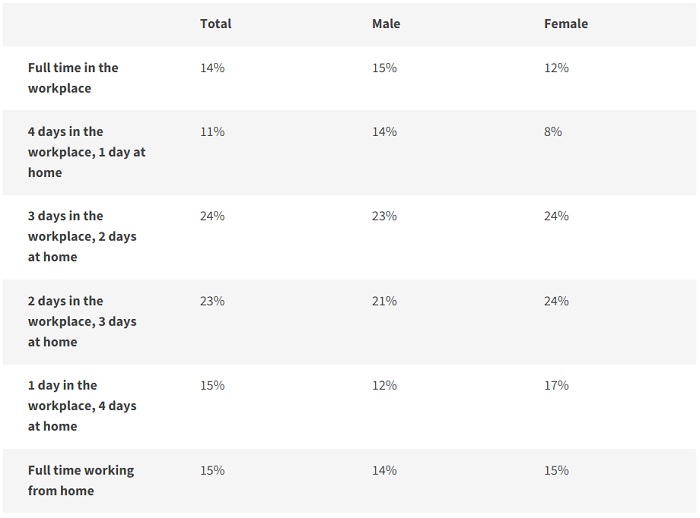Gender divisions in work life beyond the pandemic

- More than a third (35%) feel their work/life balance has improved during the pandemic, yet one in five (20%) have been negatively impacted
- 44% feel they can never switch off from work as many employers are seen to encourage an always-on, ever-present culture
- Women are more concerned about burnout and less likely to feel hard work entitles them to take “me” time back during office hours
- Diverse preferences emerge on hybrid working, putting pressure on employers to tailor their response
- 69% of employees say flexible working will play a more important part in future job/career choices.
Almost half of employees* (47%) have become less career focused as a result of the pandemic, up from a third (36%) in August 2020 according to a study** by Aviva into the UK’s changing relationship with work.
It also exposes the gender divisions behind many people’s pandemic experience, and highlights diverse attitudes towards hybrid working that will challenge employers to tailor their responses.
New patterns of living and working have prompted many Britons to reassess their relationship with the workplace. Aviva’s newest report ‘Thriving in the Age of Ambiguity’ draws on findings from the last 18 months, beginning in February 2020 before Covid-19 struck, to explore the impact on working life, from wellbeing and work-life balance to employee-employer relationships.
Impacts of change are visibly fractured along gender lines
Aviva’s findings reveal more than one in three (35%) workers feel their work/life balance has improved during the pandemic. However, one in five (20%) have been negatively impacted, while a similar percentage (21%) report a negative impact on how they feel about their job.
More than two in five (44%) employees feel they can never switch off from work, while nearly as many (39%) feel their employer does not encourage them to do so outside of their contracted hours. One result of this always-on, ever-present culture is that 40% of employees are concerned about work-related burnout.
While both men and women are equally likely (52%) to feel the boundaries between work and home are “increasingly blurred”, the impacts are visibly fractured along gender lines. Aviva’s findings show women are:
- More likely to report a negative impact on their work/life balance (24% vs. 16% of men)
- Noticeably more concerned about the risk of work-related burnout (46% vs. 35% of men)
- More likely to feel life has become more challenging over the last six months (77% vs. 72% of men)
- Less likely to feel hard work entitles them to claim back “me” time during work hours (64% vs.72% of men)
What should future workplaces and working patterns look like?
Aviva’s findings show the working population has diverse preferences when it comes to designing the optimal working week. Nearly as many people (14%) would prefer to work full-time in the office as feel their most productive arrangement means working from home five days a week (15%).
The study suggests employers will need to carefully examine how they bring people back into the workplace to avoid deepening the gender divide, with the risk that those – often women – with primary care roles for their children or parents are put under increasing strain.
While more than half of men (52%) feel the most productive ‘hybrid’ work arrangement for them would involve three or more days in the office, only 44% of women agree.
Table 1: Gender and generational perspectives on the most productive hybrid working pattern***

More than two in three women (67%) feel complete flexibility around which hours they work during the day (aside from in person/virtual meetings) would make them more productive. Among men, 62% feel the same.
These findings have major implications for how employers construct hybrid work policies in the post-pandemic world to keep staff motivated and engaged, as a broad spectrum of views may co-exist within any business.
Overall, nearly seven in ten (69%) employees say flexible working will play a bigger role in future decisions about their job or career choices. Women are more likely than men (71% vs 67%) to say this is the case.
Generational priorities in the new world of work
Aviva’s research also highlights generational differences in people’s priorities in their current jobs. When it comes to working patterns, adults in Gen X – aged 40-54 – are almost twice as likely to prefer full-time home working as those in Gen Z, aged 18-24 (15% vs. 8%).
More than one in three (34%) adults in Gen Z rank the social aspect of being with or around other people at work as their number one priority. This compares with just 20% across all age groups.
In contrast, adults in Gen X aged 40-54 cherish work-life balance more than any other age group, with nearly half (47%) stating this is their single biggest priority.
Gen Y – adults aged 25-39 – are the most likely age group to put a premium on peace of mind and good mental wellbeing: 33% make this their top priority, compared with 25% overall.
Debbie Bullock, Wellbeing Lead at Aviva, comments: “The journey towards the workplace of the future has been accelerated by the pandemic, from decreasing office space and increased homeworking to widespread digitisation and non-linear careers.
“Employees will look for something in return to encourage them back to the office, and employers must ensure offices become a destination for collaborating, mentoring and socialising to rebuild relationships. It is also vitally important that people are treated as individuals, rather than employers trying to impose a one-size-fits-all approach. The pandemic may have been a collective experience, but the impact has been fragmented in so many ways, with women especially facing particularly acute stresses from the blurring of lines between home and work.
"Employers must ensure offices become a destination for collaborating, mentoring and socialising to rebuild relationships."
“An always-on, ever-present culture is guaranteed to end with people’s batteries depleted, and it is essential that employers recognise long-term productivity is only possible if you make space for wellbeing to flourish at work. Businesses who choose to plough on regardless will discover to their cost that if you can’t make time for staff wellness, you will be forced to make time for illness and live with the repercussions.”
Danny Harmer, Chief People Officer at Aviva, comments: “People need to do their work in the place that produces the best outcome for the organisation, the customer and employees. Aviva, for example, is creating five profiles that suggest what proportion of time is best spent in the office.
“Rather than having pre-set rules, we are encouraging our leaders to use these frameworks and engage with colleagues to implement an approach that works for their business area. In practice it will be an interplay of their role and working environments together with the ebb and flow of work demands.
“As the office becomes the venue for collaboration rather than solitary work, then synchronising schedules within teams will also be a priority.”
*Throughout the release, employees/workers refer to people working in large companies (1,000+ employees)
**Independent research of 2,000 UK employees working in organisations with over 1,000 employees was conducted on behalf of Aviva by Quadrangle in February 2020, August 2020 and March 2021.
***Columns may not add up to 100% in every instance due to rounding
Authored by Aviva
About Aviva
Aviva Insurance Limited is one of the UK’s leading insurance companies, part of the Aviva group with 34 million customers Worldwide. Aviva Insurance has been in the insurance business for more than 300 years.
In UK commercial, the insurance market remains challenging for insurance brokers and customers, due to the ongoing economic conditions. Aviva Insurance are focusing on improving our processes to ensure Aviva provide commercial customers with insurance cover at an acceptable price. Insurance brokers also recognised our excellent customer service by voting us Insurance Times General Insurer of the Year in 2012, for the second year running. youTalk-insurance sharing Aviva insurance news and video.

